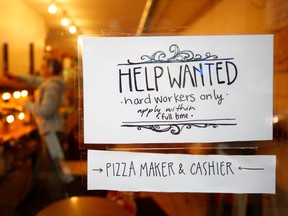
A new survey from the Canadian Federation of Independent Business (CFIB) showsa some of the issues small businesses face during the ongoing labour shortage.
A lack of skilled labour continues to limit business growth for 53% of businesses, while the lack of semi-/unskilled labour is hurting 38%, according to the latest CFIB Business Barometer.
As the Canadian national soccer teams head to their respective FIFA World Cups, Derek Van Diest is on the scene to cover all the action. Expect expert insights and analysis in your inbox daily throughout the tournaments, and weekly on Thursdays for the rest of the season.
Thanks for signing up!
A welcome email is on its way. If you don't see it, please check your junk folder.
The next issue of Corner Kicks with Derek Van Diest will soon be in your inbox.
Over half (52%) of small businesses have yet to return to normal revenue levels, while an even greater number (58%) haven’t repaid their pandemic debt, according to CFIB’s Small Business Recovery Dashboard.
Adding insult to injury, the survey reports that over the past year more than a third of small business employers were ghosted by new or potential staff: 36% of small businesses hired people who either never showed up or stopped coming to work soon after starting, and 37% report job candidates who just stopped responding during the application process.
Employers are having a hard enough time filling jobs as it is, and, “Ghosting is not only a frustrating waste of their time, it’s a big drain on their already limited resources,” said Dan Kelly, president of CFIB.
“Job candidates and employees don’t have to take or stay in jobs they don’t like, but they should at least communicate their intentions clearly to their employer instead of leaving them scrambling and wondering.”
As small businesses are facing these labour challenges, CFIB calls on the federal government not to make any permanent changes to the EI system — especially changes which could increase the cost of doing business or disincentivize people from working.
CFIB recommends that the federal government not implement permanent changes to the EI system until the economy has fully recovered.
In particular, making coverage for the self-employed mandatory needs to wait as it could have significant cost implications for many small businesses.
And it’s hoped that a full and detailed costs analysis of all expansion proposals will be done and a plan laid out to make sure EI remains sustainable without imposing any new costs on employers.
The survey polled 3,264 CFIB members between November 10-28, 2022. A probability sample with the same number of respondents would have a margin of error of ±1.7 per cent, 19 times out of 20.


